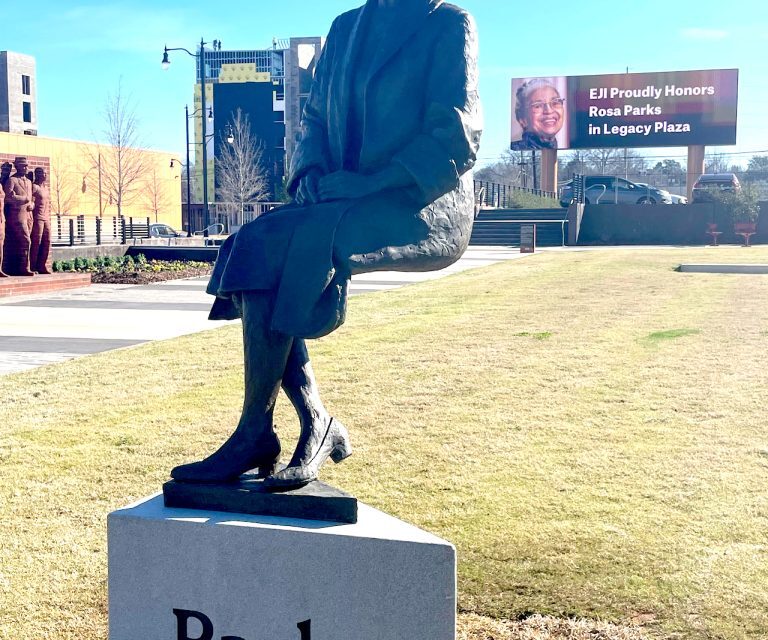The Equal Justice Initiative has unveiled a new statue honoring Rosa Parks — the first in a series of statues that will pay homage to icons of the Civil Rights Movement in Montgomery.
“I just think it’s amazing that Montgomery has produced such extraordinary people who have had such a profound impact all over the world,” said Bryan Stevenson, executive director of EJI speaking at the unveiling on Wednesday. “We are not a huge city, but when you think about the contributions that people from this community have made, we’re an extraordinary city.”
Parks, an Alabama native, refused to give up her bus seat to a white man in 1955 and was arrested. Though she was not the first person to be arrested, her case inspired the Montgomery Bus Boycott, which lasted for more than a year and eventually forced the end of segregation ordinances.
The statue, located in Legacy Plaza, next to EJI’s Legacy Museum, portrays a seated Parks. The plaza is a gathering place that showcases art and gives visitors a place to reflect after a visit to the museum, which tells the story of the trans-Atlantic slave trade and how it continues to influence the way Black Americans are treated in the justice system and in society.
“This Black History month, on Valentine’s Day, there are many of us who want to express our love, appreciation and gratitude to Mrs. Rosa Parks whose extraordinary leadership inspired the whole world. As someone who had the privilege of spending time with Mrs. Parks, I can affirm that she had the kind of power and conviction that could absolutely change the world. We are thrilled to honor her at Legacy Plaza,” Stevenson said in a press release.
Parks was awarded the Presidential Medal of Freedom in 1996 and was the first woman to lie in honor at the U.S. Capitol rotunda.
EJI also plans to unveil statues of Dr. Martin Luther King Jr. and former congressman John Lewis in the plaza. But Stevenson said it was important to start with Parks because so much of the city’s activism began with her.
“Mrs. Parks of course was the force behind the Montgomery Bus Boycott, which was really the beginning of the most dramatic era of civil rights activism in Montgomery. And while Dr. King led the community during that time, it was Mrs. Parks’ act, it was her character, it was her reputation that allowed the entire community to say ‘we’re in.’” he said.
Stevenson said he hopes the statue will inspire visitors to reflect on this history of the civil rights movement, even as lawmakers try to erase it.
“There’s so much resistance to fully embracing this history, to understanding this history. There are people in this country that would like folks not to talk about the activism and the struggle and the history and the challenges that we’ve had to overcome and I just think that we’ve got to push past that,” Stevenson said.
“I believe we need an era of truth and justice in America to get where we’re trying to go. We’re not there yet and we can’t get there if we’re not willing to have these conversations. And so if Mrs. Parks could inspire the Montgomery Bus Boycotts and the Civil Rights movement, I’m hoping she can inspire us in 2024 to push past the fear, to push past the anger and have the courage to learn our history with an open heart…we can actually strengthen our commitment to freedom.”
The statue was created by the Atlanta-based sculptor Basil Watson.
Along with Stevenson and Montgomery Mayor Steven Reed, the unveiling was attended by Parks’ colleague and fellow advocate, Doris Crenshaw, the director of the Southern Youth Leadership Conference, Georgette Norman, former director of the Rosa Parks Museum in Montgomery, and Dr. Tommie Tonea Stewart, Dean of the College of the College of Visual and Performing Arts at Alabama State University.











